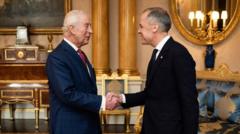As Canada readies for a historic visit from King Charles III, Prime Minister Mark Carney is harnessing this moment to emphasize Canadian independence. This invitation marks a notable shift from past sentiments after a history of contentious royal relations, dating back to when Prime Minister Stephen Harper's 2011 decisions drew criticism for reinforcing ties to the British monarchy. In contrast, Carney’s move signals a renewed embrace of the Crown as a bastion of Canadian identity against the backdrop of former U.S. President Donald Trump's insistence that Canada resembles a "51st state.”
Historian Justin Vovk described Carney’s invitation as a grand display of sovereignty that counteracts America's historical break from the monarchy. While Canada remains a constitutional monarchy, it has incrementally distanced itself from British rule, culminating in Trudeau's 1982 constitution repatriation. The King's upcoming speech will be his first in Canada since 1977 and comes at a critical juncture; it seeks to strengthen national symbols while addressing economic tensions that arose during Trump’s presidency.
Contrary to past indifference toward royal ties among Canadians, the current climate could redefine public perception of the monarchy, particularly regarding its historical impact on Indigenous communities. Questions linger about future relations, particularly amid Quebec’s ongoing calls to lessen ties to the Crown. However, Carney sees the King's visit as pivotal for both Canadian identity and international relations, aiming to solidify Canada’s stance as it seeks new allies amid changing allegiances.
With an impactful agenda on the horizon, King Charles III's visit, though brief, is set to resonate far beyond its ceremonial duties, as it embodies Canada’s ongoing quest for distinctiveness in a complex geopolitical landscape.



















